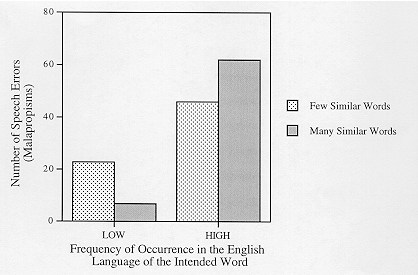The Characteristics of Words that Lead to Malapropisms
Michael S. Vitevitch – mikev@deuro.fss.buffalo.edu
Dept. Of Psychology and Center for Cognitive Science
State University of New York at Buffalo
Popular version of paper 5aSC5 presented presented at the 131st ASA Meeting in Indianapolis, IN
We have all had the embarrassing experience of saying one thing when we really meant to say another. Sigmund Freud claimed that, like dreams, slips of the tongue revealed our true thoughts and feelings that had been buried away, deep within our minds. While that may be true for some speech errors, researchers interested in language have found other causes for why we make speech errors of various kinds. By investigating the types of mistakes we make it is believed we can gain some insight into how the language production system works when it is functioning properly.
One type of speech error currently under investigation is the malapropism. A malapropism is a whole word that supplants an intended word. (Other types of speech errors involve segments of sound supplanting intended sound segments). The words that are involved in malapropisms are related to each other in the way that they sound. However, the words that are involved in malapropisms are not related to each other in their meanings. Examples include saying “illegitimate” instead of “illiterate,” “monotony” instead of “monogamy,” and “octane” instead of “octave.”
Our investigations into the way we store the words we know in memory suggest that the frequency with which a word appears in the English language and the number of words that sound like that word affect our ability to produce that word accurately. We attempted to study this relationship by analyzing a corpus of speech errors that had been collected from natural situations over a number of years. (The 138 malapropisms that were examined can be found in the appendix of Fay and Cutler, 1977). The frequency of occurrence for the intended words and the number of words that sounded similar to the intended words were found in a computerized dictionary.
We found that a word that occurs frequently in the English language and that has many words that sound like it is more likely to be involved in a malapropism than a word that occurs frequently and that has few words that sound like it. In addition, a word that does not occur frequently in the English language and that has few words that sound like it is more likely to be involved in a malapropism than a word that does not occur frequently and that has many words that sound like it –the exact opposite finding of words that occur frequently (see the figure below).
These contradictory findings lead us to believe that words are stored differently in memory depending on how often they occur. Words that occur frequently are strongly represented in memory. Words that do not occur frequently are weakly represented in memory.
To illustrate this point, picture words as being miniature demons in our heads screaming out loud in order to get our attention. Words that occur frequently will scream louder than words that occur less often. If we picture that demon being surrounded by other demons (or words) that are similar to it, we can perhaps understand why these characteristics of a word may lead to a speech error.
A demon that is screaming loudly (a very frequent word) that is surrounded by many demons may have its individual voice drowned out by the crowd. This is like what happens at a football game when all the fans are yelling different things, producing a non-distinct roar. In this case, any demon may be selected by the speech production system to be spoken. However, a demon that screams loudly when there are few demons around it can be clearly “heard” or recognized (and consequently is selected by the speech production system to be spoken). This is analogous to a mediator “talking over” his guests during a panel discussion in order to make his point heard.
Conversely, a word that we don’t encounter very often that is surrounded by many similar words can gain support from those words around it. This situation is analogous to a choir all singing the same song. The soloist can be heard above the voices of the rest of the choir which provides additional voices to support the soloist. In this situation the speech production system makes a correct selection. However, a word we don’t encounter very often that is surrounded by few similar words will be very difficult to recognize or identify. This situation may be analogous to an individual mumbling to themselves in the middle of a large, empty auditorium. Trying to accurately recognize the words that the individual is saying in this instance is very difficult. Thus, mistakes and mis-selections will be made in the speech production system.
These investigations are not only telling us something about how the speech production system works, but also about how the speech perception system may work. They also shed some light onto how our memory system in general may work. Discovering such knowledge allows others to develop new ways to instruct and assist those with (and without) either acquired or congenital disabilities. This work may also aid in the development of computers that can interact with humans using real language.
The number of speech errors (malapropisms) found in the corpus of 138 malapropisms as a function of how many words were similar to the intended word and the frequency of occurrence of the intended word in the English language. Overall, more malapropisms were found among high frequency words than low frequency words. In addition, more malapropisms were found among high frequency words that had many similar words than among high frequency words that had few similar words. The opposite pattern was found among low frequency words.

